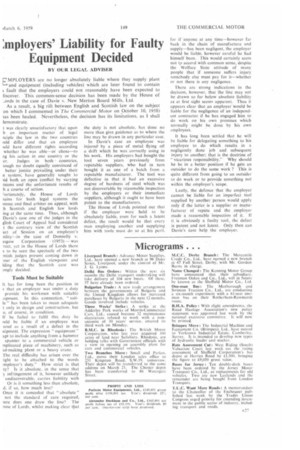:mployers' Liability for Faulty Equipment Decided
Page 69

If you've noticed an error in this article please click here to report it so we can fix it.
BY OUR LEGAL ADVISER
EMPLOYERS are no longer absolutely liable where they supply plant and equipment (including vehicles) which are later found to contain t fault that the employers could not reasonably have been expected to liscover. This common-sense decision has been made by the House of _ords in the case of Davie v. New Merton Board Mills, Ltd.
As a result, a big rift between English and Scottish law, on the subject on which I commented in The Commercial Motor on October 10, 1958) las been healed. Nevertheless, the decision has its limitations, as I shall lemon strate.
t was clearly unsatisfactory that upon h an important matter of legal lei* the law in the two countries
■ uld differ and that an employee iuld have different rights according whether he was able—or chose—to rig his action in one country or the
Cr. Judges in both , countries, lough no doubt equally convinced of better justice prevailinge under their n system; have generally sought to id both. an open conflict by varying isions and the unfortunate results of
b a course of action.
:ortunatelY, the House of Lords ^mins for both legal systems the ireme. and final arbiter on appeal. With b Scottish and English law lords ing at the same time. Thus, although Davie's case one of the judges in the g.listi Court of Appeal had considered .t the contrary 'view of the' Scottish urt of Session on an employer's ailityL–in the 'case of Donnelly v.
asgow Corporation ( t 953) — was Teel, yet in the House of Lords there s to be seen the spectacle of the two Mist' judges present coining down in our of the English viewpoint and Wing that the Scottish case was angly decided.
Tools Must be Suitable It has for long been the position in v that an employer was tinder a duty provide his workmen with suitable aipment. In this connection, " suitle " has been taken to mean adequate
t only in design and construction. but o, of course, in condition.
If he failed to fulfil this duty he • old be liable if an employee was ured as a result of a defect in the uipment. The expression " equipment" apt to include anything from a hammer spanner to a commercial vehicle or mplicated piece of machinery, such as ad-making plant or a heavy crane. The real difficulty has arisen over the ight to be attached to the words amployer's duty." How strict is that ty? Is it absolute, in the sense that y infringement of it, however unlikely undiscoverable. carries liability with Or is it something less than absolute, d, if so, how much less?
Once it is conceded that " absolute" not the standard of care required, sere does one draw the line? The 311Se of Lords, whilst making clear that
the duty is not absolute, has done no more than give guidance as to where the line may be drawn in any particular case.
In Davie's case an employee was injurecil by a piece of metal flying off a drift which he was correctly using in his work. His employers had bought the tool seven years previously from reputable suppliers, who had in turn bought it as one of a batch from a reputable manufaeturer. The tool. was. defective in that it had an excessive degree of hardness of steel which was not discoverable by reasonable inspection by the employers or their immediate suppliers, although it ought to have been patent to the manufacturers.
The House of Lords pointed out that if the employer were held to be absolutely liable, even for such a latent defect, the result would be that every man employing another and supplying him with tools-must do so at his peril.
for if anyone at any time—however far hack in the chain of manufacture and supply—has been negligent, the employer would be liable, however careful he had himself been. This Would certainly seem not 1p accord with common sense, despite the Welfare State attitude of many people that if someone suffers injury somebody else must pay for it—whether or not there is any negligence.
There arc strong indications in the decision, however, that the line may not be drawn so far below absolute liability as at first sight seems apparent. Thus it appears clear that .an employer 'would be liable for the negligence of an independent contractor if he has engaged him to do work on his own premises which normally might be done by his own employees.
It has long been settled that he will be liable for delegating something to his employee to do which results in a negligently done job and subsequent injury to another; that is the doctrine of "vicarious responsibility.' Why should he be in a better position if he gets an outsider to do the sane Work ? This is quite different from going to an outsider to do work Or to provide something not within the employer's scope.
Lastly, the defence that the employer cannot be liable for an imperfect tool supplied by another person would apply only if the" latter is a supplier or manufacturer of repute and the employer made a reasonable inspection of it. If it is obviously a faulty tool, the defect is patent and not _latent. Only then can Davie's case help the employer.




















































































































